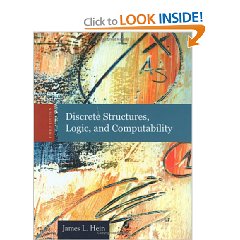 [photo from Amazon.com]
[photo from Amazon.com]
CS 163: Data Structures Math 252: Calculus IIThis course assumes a basic understanding of the concepts of computer science and programming, although there will be no programming in this class. The concepts of calculus are somewhat tangential to the material in this class. A familiarity with mathematical thinking, terminology, and concepts is required, although this class will not use calculus directly.
Week 1March 29 |
Proofs Reading: Section 1.1 Lecture notes Practice exercises: 1, 3ae, 4ac, 6a, 7a, 8a Sets Reading: Section 1.2 Lecture notes Practice exercises: 1ae, 2ac, 3aceg, 6ace, 7a, 8a, 10ac, 11ac, 16ac, 19ace, 23e, 28ac Ordered Structures Reading: Section 1.3 Lecture notes Practice exercises: 1, 2ace, 4ac, 5ac, 8ace, 9ace, 10ace, 11a, 12ac, 13ace, 14ac, 16a, 17c, 18c Graphs and Trees Reading: Section 1.4 Lecture notes Practice exercises: 2, 4ac, 5ab, 7ab, 8, 9, 11 Homework 1 |
Week 2April 5 |
Functions: Definitions and Intro Reading: Section 2.1 Lecture notes (not online) Practice exercises: 1ac, 2ace, 3ac, 4ac, 5, 6ac, 7ac, 11ac, 12ac, 13ac, 14a, 15e, 18a, 19c Constructing Functions Reading: Section 2.2 Lecture notes (not online) Practice exercises: 1aceg, 2ac, 3ac, 4a, 6, 7a, 8a, 9ace, 11a Properties of Functions Reading: Section 2.3 Lecture notes (not online) Practice exercises: 1, 2ac, 3a, 4ace, 5ace, 6ac, 7ac, 8a, 9aceg, 10a, 11ac, 12ac, 13ac, 15ac Homework 2 |
Week 3April 12 |
Countability Reading: Section 2.4 Lecture notes Practice exercises: 1ac, 2aceg, 3ac, 4ac Inductively Defined Sets Reading: Section 3.1 Lecture notes Practice exercises: 1a, 2ace, 3a, 4a, 6aceg, 7ac, 9a, 10ace, 11a, 13, 15, 16a, 17a, 18ac Recursive Functions and Procedures Reading: Section 3.2 Lecture notes Practice exercises: 1, 3, 4ace, 5ace, 6ac, 7ace, 10a, 14a, 15ac, 16a,18a, 19ac, 22, 24a Homework 3 |
Week 4April 19 |
Properties of Binary Relations Reading: Section 4.1 Lecture notes Practice exercises: 1acegi, 2ace, 3a, 4ac, 5ac, 7a, 8a, 9ac, 12ac, 13ac, 15c, 16ab, 22c Homework 4 |
Week 5April 26 |
Equivalence Relations Reading: Section 4.2 Lecture notes Practice exercises: 1ace, 2ace, 3aceg, 4a, 5a, 7a, 9 Order Relations Reading: Section 4.3 Lecture notes Practice exercises: 1ac, 2ace, 3abc, 5, 7ac, 9, 11, 14ac Inductive Proof Reading: Section 4.4 Lecture notes Practice exercises: 2acegi, 3a, 4a, 7, 10a, 11a, 13, 15, 20 Exam 1 Answer Key |
Week 6May 3 |
Analyzing Algorithms Reading: Section 5.1 Lecture notes Practice exercises: 1, 2ac, 3 Summations and Closed Forms Reading: Section 5.2 Lecture notes (Read 5.2.1; Skip 5.2.2-5) Practice exercises: 1ac, 2ace, 3ac, 4aceg, 6a, 7a, 8a Permutations and Combinations Reading: Section 5.3 Lecture notes Practice exercises: 1ace, 2ace, 3ace, 4, 5ace, 7, 9 Discrete Probability Reading: Section 5.4 Lecture notes Practice exercises: 1ac, 2ac, 5, 6ac, 7ac, 8ac (Read 5.4.1-4; Skip 5.4.5; Read 5.4.6) Solving Recurrences Reading: Section 5.5 Lecture notes (Read 5.5.1; Skip 5.5.2-3) Comparing Rates of Growth (Not covered) Section 5.6 - Not assigned Lecture notes Homework 5 |
Week 7May 10 |
Elementary Logic Reading: Section 6.1 Lecture notes Propositional Calculus Reading: Section 6.2 Lecture notes Practice exercises: 1ac, 2a, 3, 5, 7ace, 8aceg, 9ace, 10aceg, 11ace, 12aceg, 13a, 14ace, 15ace Formal Reasoning Reading: Section 6.3 Lecture notes Practice exercises: 1a, 2, 3a, 4, 5acegi, 6aceg, 7acegik, 8a, 9a |
Week 8May 17 |
First-Order Predicate Logic Reading: Section 7.1 Lecture notes Practice exercises: 1a, 2ace, 3a, 4, 5ac, 6, 7a, 8a, 9a, 10a, 11ace, 12aceg, 13a, 14ac, 16aceg, 17ac Equivalent Formulas Reading: Section 7.2 Lecture notes Practice exercises: 1ace, 2ac, 3ac, 4ace, 5ace, 6a, 7ace, 8aceg, 9a, 10aceg Homework 6 |
Week 9May 24 |
Formal Proofs in Predicate Calculus Reading: Section 7.3 Lecture notes Practice exercises: 1ace, 2, 3a, 5, 6aceg, 7ace, 8ace |
Week 10May 31 |
Program Correctness Reading: Section 8.2 Lecture notes Practice exercises: 7, 8a, 9, 13ac, 14ac, 15ac, 16ac, 17ac, 18a Homework 7 |
Finals Week |
Final Exam --- Thursday, June 10, 2010 --- 12:30PM-2:20PM
Study-Guide-for-Final |
10% - Homeworks 12% - In-class quizzes, class participation 50% - Midterm Exams 30% - Final ExamIncompletes will not be given.
https://mailhost.cecs.pdx.edu/mailman/listinfo/porterclasslist2/The MailMan program will email you a confirmation message. You must reply, but you can simply hit your email "reply" button. After being adding to the mailing list you will get a "welcome" message from me.
PorterClassList2@mailhost.cecs.pdx.eduFor additional documentation, see
staff.imsa.edu/~ckolar/mailman/mailman-userguide-0.1.pdf (pdf, 159 kb)(By the way, if Internet Explorer does not work with MailMan on the Mac, use the "Safari" web browser instead.)